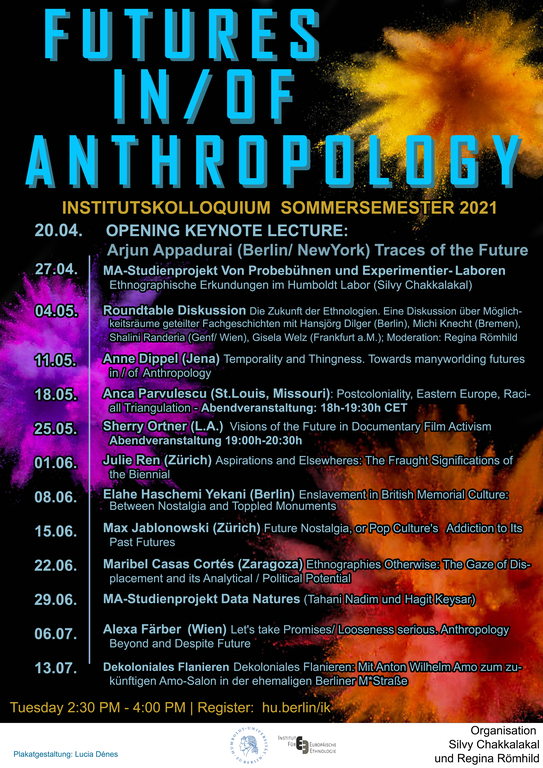Sommersemester 2021 - Futures in / of Anthropology
How is ‚the future‘ conceptualized in anthropology today? And how does the future – as a special temporality in relation to others – affect anthropological research and its own future in interdisciplinary and public debates? Which specific politics of time are entangled within various futures as well as in anthropological future research and how do we deal with these temporal engagements and involvements theoretically, methodologically and ethically?
Futures in/of Anthropology.
Perspectives of a Public and Engaged Anthropology
Tag und Zeit: dienstags von 14.30-16.00 Uhr
Tuesdays 2:30 pm - 4pm on zoom. Register below to get the link.
How is ‚the future‘ conceptualized in anthropology today? And how does the future – as a special temporality in relation to others – affect anthropological research and its own future in interdisciplinary and public debates? Which specific politics of time are entangled within various futures as well as in anthropological future research and how do we deal with these temporal engagements and involvements theoretically, methodologically and ethically?
In light of these opening questions, we are very much interested in the relations of an Anthropology of the Future as Public (Marcus/Pisarro; Goode) and Engaged or Critical Anthropology ( Low/Merry; Hamm; Ortner). After the critical remark of Arjun Appadurai that anthropology had quite little to say about the future, especially about future being a “cultural fact” of social imagination and aspiration in the present, there is a notable, growing interest in future making, in past futures and futures of the past, as well as in thinking about temporalities in the plural. Today, the self-critical notion of anthropology’s “Time and the Other” (Fabian) is being connected to a further inquiry in multiple “other times”. An emerging critique of the “imperialism of universal space and time” (Barad) is thus questioning Eurocentric concepts of linear, teleological “trajectories” (Appadurai) of ‘progress’ and ‘development’ as well as heteronormative politics of time and reproduction (Halberstam; Muñoz).
The way that notions of futurity function as relational categories is apparent from a diversity of everyday practices within social fields (Chakkalakal). In view of this, we are interested in how different futures are being practiced, narrated, placed, and made tangible in everyday life worlds. This interrogation of future making and future renouncing, of temporal practices, and of processes of temporalization will lead us to a range of different social fields and current postcolonial and cosmopolitical questions regarding human and more-than-human relations. We hope to make the question of whether and how anthropology can contribute to decolonize its fields of inquiry from a perspective reaching out beyond Eurocentrism and Occidentalism a central focus.
Within such emerging ethnographic fields of anticipatory research, we would like to open up an epistemological and methodological discussion about anthropological future research. Here, imagination, speculation, anticipation, aspiration, hope, and promise can be understood as heuristic concepts and employed as anthropological research methods (Bryant/Knight). In what ways does this press for a rethinking of hegemonic legacies in organizing and positioning anthropological knowledge production – in relation to “other anthropologies and anthropologies otherwise” (Restrepo/Escobar)? How does the globalization of the anthropological project affect European based anthropologies and their inner separation that follows a colonial epistemological distinction between the legacies of “Volkskunde” and “Völkerkunde” (Knecht/Römhild)?
Questions of this kind will be addressed from an international set of speakers. Lectures will be commented by local discussants. We hope for a stimulating discussion on anthropology as a public discipline that is simultaneously engaged in questioning normative powers of the future as well as in critical future making.
Anmelden | Register
Nach dem Eingeben Ihrer E-Mail-Adresse erhalten Sie automatisch den Zoom-Link

